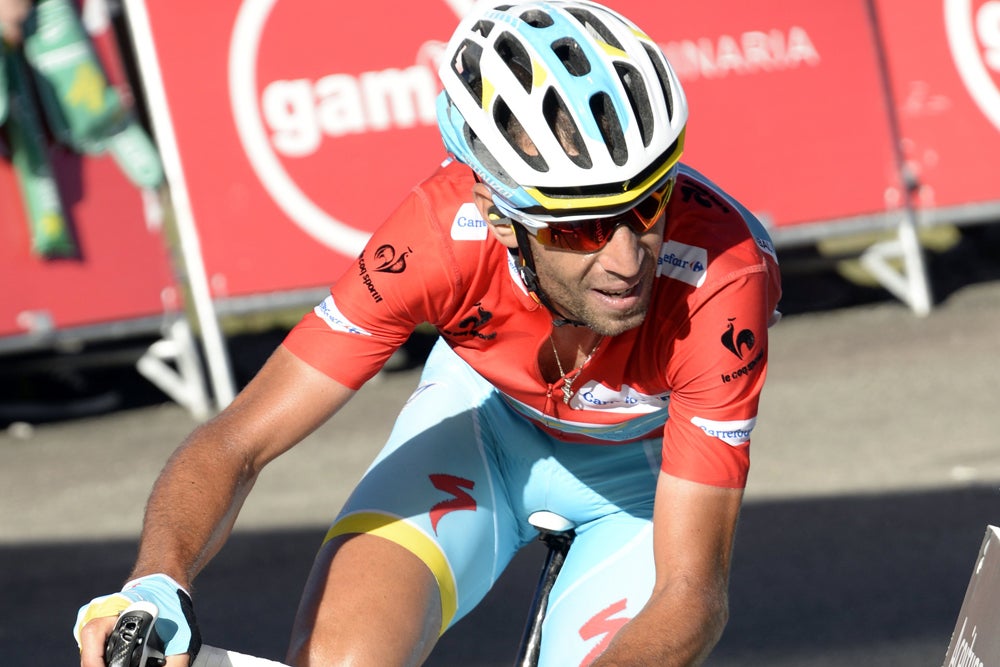As Nibali’s Vuelta lead drops, so do his power numbers

Vincenzo Nibali was unable to match the accelerations by Chris Horner and Alejandro Valverde on Monday. Photo: Graham Watson | <a id="www.grahamwatson.com" href="http://grahamwatson.com">www.grahamwatson.com</a>
MILAN (VN) — Vincenzo Nibali (Astana), despite carrying the lead into today’s second rest day of the Vuelta a España, is becoming weaker. Team manager Giuseppe Martinelli explained that his star rider has lost 20 watts since winning the Giro d’Italia in May.
It is a worrying sign with five days left to race and a slim, 28-second lead over American Chris Horner (RadioShack-Leopard). Nibali faces three important mountain stages, including L’Angliru, between the rest day today in Graus and the Madrid finale on Sunday.
Yesterday, after losing nearly half a minute to his key rivals, Horner and Alejandro Valverde (Movistar), Nibali explained his watts are dropping. The Italian told La Gazzetta dello Sport, “It’s true. I lack about 15 to 20 average watts.”
With Ryder Hesjedal (Garmin-Sharp) and Bradley Wiggins (Sky) abandoning the Giro, Nibali stormed the race’s final stages to win handily. The real fight appeared to be for second place, which Rigoberto Urán (Sky) snatched from Cadel Evans (BMC Racing) on the final, snowy mountain day to Tre Cime di Lavaredo.
Nibali, after winning the 2010 Vuelta and placing third in the 2012 Tour de France, had made the Giro d’Italia his focus. Martinelli told Italy’s daily sporting newspaper that Nibali produced 20 watts more in the Giro. He compared the Giro’s Jafferau stage to Saturday’s Andorra stage, which featured similar foul weather and where Nibali produced, on average, around 360 watts.
“I prepared for the Giro, training in a perfect way. It was my big season goal,” he explained. “The Vuelta is completely different, approaching it after two months out of racing [one month completely off the bike]. The results can’t be the same. I’d predicted that one day could go wrong.”
Valverde and Horner attacked Nibali when they saw the 28-year-old Nibali was having a bad day. Their gains were small, but so is Nibali’s lead.
What watts?
Martinelli has managed teams for 25 years and told VeloNews in May that power meters have become an important tool in cycling. If a rider knows how much power he can or cannot produce, then he can ride to his abilities and, like Nibali yesterday when Horner attacked, nothing more.
“It looks scientific but it’s that way,” Martinelli said. He referred to Sky’s method of riding a high pace on the climbs to prevent attacks. “If one knows he can hold 360 watts on the climb, a rival can only [attack] for one or two kilometers, take 50 seconds, but after that, that’s all they can do. I hope that this is not cycling’s future because it’ll be too easy. You sit at the computer and you program it all!”
Nibali stepped into the watts debate on his way to winning Tirreno-Adriatico in March, when Sky’s riders were blamed for riding like robots.
“Some think that SRM [power meters] and team’s cars decide the race … but we are the ones that read the race. You need to have that capacity to read the race,” Nibali explained. “The SRM helps us know how we are feeling, it’s helpful, but [this way] of interpreting the race doesn’t always work.”
He won the Tirreno-Adriatico overall with a daring attack on a rainy, mid-mountain stage. The Vuelta’s remaining mountain stages — Peña Cabarga, Alto del Naranco, and L’Angrilu — will take a measured effort and may become a numbers game. Who can produce the most watts? And who is the freshest? Horner, who sat out with knee problems, is the only one of the favorites not to have raced a grand tour prior to the Vuelta. Valverde raced and placed eighth in the Tour de France.
“Maybe it’s even more difficult mentally to prepare [to win] two grand tours,” added Nibali yesterday. “It’s an enormous effort.”